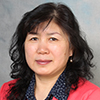How Drug Discovery can get you into big pharma: Sheffield University professor explains


The long quest of discovering safer drugs to ensure a proper treatment regime for various diseases has gained a new impetus amid the pandemic. The University of Sheffield is a leading institution in this field and it offers a unique MSc course in Drug Discovery Science which comes with theoretical, practical and research-based modules.
Beining Chen, a professor of Medical Chemistry at the university, leads this course. She shares her insight into the fundamentals of this exciting field and talks about the opportunities available for the students of this course through a Zoom Chat with Edugraph.
Edugraph: What exactly is Drug Discovery Science? What are the subjects that one should study to pursue this specific discipline?
Beining Chen: Drug Discovery is not a brand-new subject — it has been around for over hundreds of years. If you look at history, Drug Discovery started around 1905-1910. As for the modern-day Science of Drug Discovery, people and chemists started making compounds for pharmacological activities as well as to treat specific diseases.
Drug Discovery is a multidisciplinary subject. Though people doing drug discovery are not expected to be experts in every scientific area, you need to know the fundamentals of Chemistry, Biology, Medicine and Computer Science to go for a career in this area.
The University of Sheffield offers an MSc course in Drug Discovery. When does the course start and what's its duration?
Beining Chen: The MSc course in Drug Discovery Science covers the process of drug discovery, ranging from computational design to drug synthesis and testing. This 12-month postgraduate course is delivered through classroom teaching, workshops/tutorials, laboratory practicals and individual research projects.
Could you tell us more about the course and its structure?
Beining Chen: The entire course is divided into 180 credits. Different modules in the course have different credits. A student who successfully completes all the modules will be awarded 180 credits, which will qualify for a master’s degree from the university.
The taught modules are worth 120 credits in total, comprising core and optional modules, which cover all aspects of drug discovery. Computer-edited drug design, medicinal chemistry, laboratory and statistical training, research skills training and some specialist therapeutic fields are highlights of the teaching materials — these have been designed to prepare the students for their ultimate research experience.
Soon after the students join the course in September, they are provided with information on their research projects, which help them to select a project of their choice. They will then start to research into the project area to understand the background of the project and plan the project as they go along the course. The students can choose one of the three main therapeutic themes for their research project — anti-cancer, anti-microbial and central nervous system diseases. The research project module is worth 60 credits and will be assessed by project talks, written thesis and vivas.
 The 12-month MSc course in Drug Discovery Science ranges from computational design to organic synthesis. It is delivered through classroom teaching and involves different workshops, laboratory practicals and individual research projects.- Beining Chen
The 12-month MSc course in Drug Discovery Science ranges from computational design to organic synthesis. It is delivered through classroom teaching and involves different workshops, laboratory practicals and individual research projects.- Beining Chen
What's so unique about this course? Is it based on theory or practical application? Or is it a combination of both?
Beining Chen: This is a postgraduate-level course where students are taught theory and given practical training, which equip students with skills for modern drug discovery. I would say the course is split almost 50:50 in terms of the time spent between theories and practicals; if anything, it’s slightly more partial to hands-on and transferable skill training. I think it is this unique combination that gives them a full overview and a solid grounding for a career in the pharmaceutical industry.
Is there any chance for students to do apprenticeships or to gain industry experience in the domain while pursuing the course? Does the university help them in this regard?
Beining Chen: As I said, it’s a pretty intense 12-month course with research projects. The students don’t have a large block of time to go into the industry to work while pursuing the course. The time available for a student to work in the industry would be very limited and that’s why not very many pharmaceutical companies are willing to offer this kind of placement. But we are still working on that to provide more opportunity to the students.
What would be the future course of career for students of the Drug Discovery course?
Beining Chen: There are so many options! Some students enrol on the PhD in Drug Discovery-related Biomedical Science areas after getting their master’s degree. Some others prefer to work in the industry. For instance, some students find jobs in big pharma companies like GSK, Pfizer and AstraZeneca as graduate trainees, while others work as research scientists at SME pharmaceutical companies. Still others go into IT or opt for further training in other related areas. Once a student completes the course, they can choose from a lot of options depending on their own aspirations and career plans.
Would they be able to contribute to figuring out ways to counter the current pandemic or prevent a future pandemic?
Beining Chen: Oh, yeah! It’s one of the reasons that the course has attracted so many applicants. Because of the global health threats caused by COVID-19, each government and pharmaceutical companies have invested significantly in drug discovery. So, the students of this course can absolutely contribute to developing the diagnostics or therapeutics for preventing a future pandemic and countering the current pandemic.
Commercialisation of scientific ideas is a big part of the pharmaceutical industry. Is bio-entrepreneurship an option for students on completion of this course?
Beining Chen: This course enables our students to learn all aspects of the pharmaceutical industry, including entrepreneurship. We invite guest lecturers from SMEs to big pharma to share their experience. A student will be able to make a connection with those companies to gain experience on that front if they are interested.